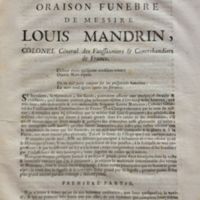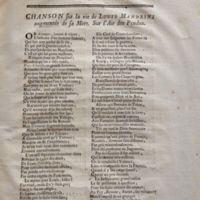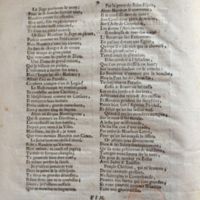CHANSON sur la vie de LOUIS MANDRIN;
Title
Subtitle
Set to tune of...
Transcription
L'histoire d'un homme fameux,
Qui fait tant parler de sa vie,
Et qui par sa grande industrie
De paysan devint un Monsieur,
C'est ce qui lui porta malheur.
Il naquit donc en Dauphiné,
Mandrin qu'on a déja roué,
Pays si fertile en grands hommes.
Avouons-le tant que nous sommes;
Que tous les gens qui y sont nés
Y voient bien plus loin que leur nez.
Qui fut sa mere? on le sçait bien;
son pere en lui fit un Vaurien:
Mais enfin, quel qu'il dùt être,
On lui donna de très-bons maîtres,
Qui le firent en peu de mois
Un vrai madré des plus adroits.
Il n'avoit pas encore huit ans,
Qu'il montroit déja des talens
Beaucoup au-dessus de son âge:
Tous les enfans de son Village,
Ils l'appelloient le fin Renard.
Mais il courut de grands hazards.
Hélas! nous le sçavons bien tous
Que le mérite a des Jaloux:
A Grenoble ainsi qu'à Valence;
Mandrin en fit l'expérience;
Je m'en vais vous dire comment:
Ecoutez attentivement.
L'an mil sept cent cinquante-deux
Antoine le cadet des deux,
De Louis il étoit le frere,
Pour certaine fâcheuse affaire,
Fut pendu très-réellement
Par ordre exprès du Parlement.
Le même jour Louis, hélas!
Fut roué, mais il n'y étoit pas;
Car il le fut en effigie,
Et si pour conserver sa vie,
Il n'eùt pris la fuite bien fort,
Il auroit été mis à mort.
Elu Chef de Contrebandiers,
A tous nos Seigneurs les Fermiers
Il se mit à faire la guerre,
Et sur les eaux & sur la terre.
Dieu préserve ses serviteurs
De la potence & des voleurs.
On l'a vu dedans Montbrison
A Bourg, à Clugny près Mâcon,
Qui sont des pays de Cocagne,
Et bien meilleurs que l'Allemagne,
Enfiler avec grand fracas
Les Commis & les Chapon gras.
Il massacroit de tout côté,
De personne il n'avoit pitié,
Et les Dames toutes tremblantes
S'enfuyoient avec leurs Servantes.
Il ne craignoit Dieu ni le Roi,
Le méchant n'avoit point de foi.
Allant aux Bureaux de Tabac,
Il en grapilloit plus d'un sac
Qu'il vendoit à cent sols la livre,
Il pilloit or, argent & cuivre;
Aux Fermiers donnoit ses billets,
Qui les trouvoient assez mauvais.
Tôt ou tard le Dieu Souverain
Punit un homme libertin.
Il permit qu'aux portes de France,
Mandrin, dormant sans défiance,
Fut pris miraculeusement.
Dieu lui pardonne au Jugement.
Par des Gardes il fut enlevé,
Qui le tinrent très-resserré.
On le conduisit à Valence,
Lieu remarquable dans la France.
Quand il y fut emprisonné,
Il parut un peu étonné.
La Justice avec grand raison
Le fit présenter à question,
Pour lui faire avouer ses crimes,
Au Puy, Beaune, Autun, ses victimes;
Mais l'impoli fit un gros pet
Pour dernier coup de pistolet.
Le Juge pardonna le coup;
Pour de sa bouche sçavoir tout,
Mandrin avoua ses offenses.
Mon ami, fais en pénitene:
Si tu meurs aussi criminel,
Tu feras un péché mortel.
Or donc Monsieur le Juge en pleurs,
Parloit comme un Prédicateur:
Mais Mandrin s'amusoit à boire,
Au lieu de changer & de croire
Une troupe de gens pieux
Qui venoient lui parler de Dieu.
Une Dame de grand renom,
Qui les visitoit en prison,
L'exhortoit à sauver son ame;
Mais l'Impie lui dit: Madame:
Allant d'ici en Paradis,
Combien compte-t'on de Logis?
Le Malheureux ne vouloit point
Se confesser en bon Chrétien;
Il blasphémoit comme un Corsaire,
Il envoyoit faire lanlaire
Petits collets, grands capuchons,
Sans y mettre trop de façons.
Alors on dit que Monseigneur,
Qui se connoit en Directeur,
Lui en choisit un fort habile,
Depuis peu venu à la Ville.
Mon Pere, lui dit-il, je veux
Que vous meniez Mandrin aux Cieux.
Le Saint homme obéit d'abord.
Il dit à Mandrin qu'il a tort.
Mon enfant, ta cause est jugée;
Tu vois ta fortune changée;
Tu pourrois bien être roué,
Et même perdre la santé.
Je n'oserai jamais te voir
Dans la peine & le désespoir.
Tu seras en grandes détresses,
Il faut donc que tu te confesses;
Sinon, je t'assures aussitôt
Que tu mourras en huguenot.
Par la grace du Saint Esprit,
Alors Mandrin se convertit;
Il se confessa tout de suite:
Son Confesseur plein de mérite,
Sur l'Acte de Contrition,
Lui donna l'Absolution.
Il embrassa de tout son coeur
Le Bourreau son Exécuteur.
En passant devant une Eglise,
Quoiqu'il n'eùt rien que sa chemise,
Il fit la génuflexion,
Tant il avoit de dévotion.
Il fut conduit à l'échafaut,
Que l'on avoit dressé bien haut;
Sur la croix soudain on le couche:
Le Bourreau n'ouvroit pas la bouche,
Mais le Per lui dit, mon fils,
Tu souperas en Paradis.
Enfin le Bourreau lui cassa
Les os des jambes & des bras,
Avec ceux des reins & des cuisses.
Et Mandrin pendant ses supplices,
Prioit bien fort l'Agneau Paschal,
Et disoit qu'on lui faisoit mal.
Quand il eut les membres rompus,
Sur la roue il fut étendu.
A la fin par miséricorde,
On lia son cou d'une corde,
Par ordre de Monsieur Levet,
Pour qu'on lui coupât le sifflet.
Or prions tous dévotement
Dieu & ses Saints semblablement,
Qu'ils nous préservent de mal faire,
Tant que nous serons sur la terre,
De peur de tomber en Enfer
Avec Judas & Lucifer.
Peuple Chrétien, qui m'écoutez:
De cet exemple profitez.
Ne faites plus la Contrebande,
Pleurez vos fautes qui sont grandes,
Et vous pourrez comme Mandrin
Faire une glorieuse fin.
FIN.
Method of Punishment
Crime(s)
Gender
Date
Execution Location
URL
Notes
Wikipedia: Louis Mandrin ( February 11, 1725 - May 26, 1755) was a French brigand (highwayman) from Dauphiné.
Mandrin has been called the Robin Hood of France. He became famous for his rebellion against the Ferme générale, the tax collecting agency of the French ancien régime (royal government). In his time, government taxes were levied on salt ( the gabelle), tobacco, and farming. The tax collectors, called fermiers, or (tax) farmers, were in charge of collecting all taxes for the king, but the total amount of the tax to be paid by the population was not specified; the tax collectors needed to pay only the pre-agreed amount to the king, but could exact unspecified sums themselves. Many of them were greedy and became wealthy and powerful through their exactions from the poor. The tax collectors were therefore hated by the people.
Louis Mandrin was born at Saint-étienne-de-Saint-Geoirs, Dauphiné, a border province, in 1725. His family was well established in the region, but was no longer as prosperous as in the past. Louis's father, a horse merchant, died when Louis was 17, leaving nine children. Louis, the eldest, hecame head of the family.
Mandrin's first run-in with the fermiers was in 1748. He was under contract to supply to French army in Italy with "100 mules minus three." Unfortunately, crossing the Alps was difficult and most of the animals died on the way to their destination, Saint-étienne-de-Saint-Geoirs. Mandrin had only 17 mules left when he arrived, and they were in such a sorry state that the tax collectors refused to pay him.
Five years later, on July 27, 1753, Mandrin and his friend Benoît Brissaud were involved in a brawl and their opponents were killed. Brissaud was sentenced to death and Mandrin to the galleys. Mandrin managed to flee but Brissaud was caught and hanged in Breuil square (now Place Grenette) in Grenoble. On the same day, Mandrin's brother Pierre was hanged for counterfeiting. Mandrin declared a personal war against the tax collectors.
Mandrin joined a gang of smugglers operating in the Cantons of Switzerland, France, and Savoy, which was then a sovereign state. They trafficked mainly in tobacco. Mandrin soon became head of this gang - a small army of some 300 men which he led and organised like a military regiment. They had warehouses for weapons and stolen goods in Savoy, and Mandrin believed himself out of the reach from the French authorities. During 1754 he organised six military-style campaigns. He and his men targeted only the most unpopular tax collectors, which gained them huge support from the local population. Mandrin bought goods (cloth, hides, tobacco, canvas and spices) in Switzerland, which he then resold in French towns without paying the Ferme Générale any of the tax due. The population was delighted with such bargains. Soon the French government passed laws forbidding the population to buy these smuggled goods. Mandrin reacted to the ban by going to Rodez and forcing Ferme Générale employees to buy his goods at gunpoint.
The Ferme générale, exasperated by Mandrin's growing popularity, obtained help from the Royal Army, but Mandrin took refuge in Savoy, near Pont-de-Beauvoisin. The tax collectors then decided to enter the Duchy illegally, disguising their 500 men as peasants. Mandrin was betrayed by of two of his men, and the tax collectors seized him at a fortified farm in Rochefort-en-Novalaise. When the King of Savoy, Charles Emmanuel III of Sardinia, learned of the French intrusion into his territory, he immediately wrote to the French King Louis XV demanding that the prisoner be turned over to him, and the French King agreed. However, the tax collectors were so eager to be rid of Mandrin that they had hurried through his trial and execution before the king's message reached them.
Mandrin was tried on May 24, 1755, and sentenced to be broken on the wheel, a penalty reserved for serious offenders, in Valence, Drôme on May 26. He was executed on May 26, 1755, in front of 6,000 onlookers, many of them sympathetic. His arms, legs and stomach were hit and broken with an iron bar and he was then hoisted on a wheel with his arms and legs under him. Mandrin endured the torture without a cry. After eight minutes, he was strangled to put an end to his suffering. His broken body was put on display. Many angry and sympathetic notes were left near the body. It was the beginning of the legend.
Mandrin's struggle against the injustice of the Ancien Régime was discussed across Europe and the cause taken up by Voltaire (who compared him with the king of Prussia)[3][4] and Turgot. A popular ballad arose, the Complainte de Mandrin, that was sung throughout France and is still known today. Its author remains unknown.
Extremely popular during his life, Mandrin remains famous to this day, in his native Dauphiné, in the Savoie and to a lesser degree, in the rest of France. A major film was made about him in 2011.



